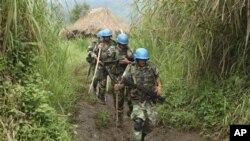Fighting for control of the capital of Congo's Equateur province has revived concerns about the strength of Kinshasa's army at a time when United Nations peacekeepers will start withdrawing in June. President Joseph Kabila's government says its troops will be ready by the time all UN soldiers are gone next year.
Ethnic Enyele rebels surprised government troops and U.N. peacekeepers with their attack on Mbandaka. They briefly held the governor's office and the airport before last week's joint counter-attack drove them back into the bush.
But the speed with which this violence has grown from a dispute over local fishing rights to a series of ambushes and this strike on Mbandaka shows the fragile state of Congolese security, even outside the more volatile eastern Kivu regions.
U.N. peacekeepers in Kivu are expected to remain at least through next year. But troops in the west are expected to begin pulling out by June, when Congo celebrates 50 years of independence from Belgian colonialism.
The U.N. Secretary General's Deputy Special Representative for Congo, Leila Zerrougui, says the government has made clear the withdrawal of the MONUC peacekeeping force will remain on schedule.
Zerrougui says she is not saying the situation in Congo does not require the continuing presence of U.N. peacekeepers, but MONUC cannot deploy if the government refuses their presence.
With nearly 22,000 troops this is the biggest U.N. peacekeeping mission. It has played a central role in restoring order in Congo, following two wars between 1998 and 2003 that resulted in the deaths of at least one-million people.
But Congolese Information Minister Lambert Mende says MONUC troops in Mbandaka failed to protect civilians during this month's fighting. He says the rebel attack should not delay MONUC's withdrawal because Congo's army will be ready to handle its own security when the last U.N. soldiers leave.
Mende says the armed forces of the Democratic Republic of Congo (DRC) are recovering, little by little, their ability to take responsibility for defending the country, like a traditional army. An army that will be ready and operational in a year, a year and half from now - the time given U.N. peacekeepers to make their gradual withdrawal.
The head of MONUC peacekeepers, Alan Doss, told the Security Council this week that there remain substantial structural shortfalls in a force drawn from both the remnants of the army of long-time dictator Mobutu Sese Seko and various militia who fought against Mobutu.
"Discipline is likely to remain a constant concern as long as the structural problems of the Congolese Army are not fully resolved, including persistent delays in the payment of salaries, insufficient supplies and a very low level of training of many troops, especially those who have been integrated from the various armed groups," said Doss.
Doss says Congo's army has taken some important measures to improve discipline as the number of soldiers prosecuted for crimes against civilians has increased substantially. But he says military impunity is still an area that needs significant improvement as part of overall efforts to reform Congo's security sector.
UN: Congo Army Still Undisciplined

Fighting for control of the capital of Congo's Equateur province has revived concerns about the strength of Kinshasa's army



